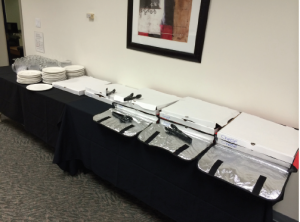
Addressing apathy starts with our elected representatives
The Dalhousie Student Union (DSU) held its first town hall meeting of the year recently. I’ve attended quite a few of these meetings in the past, and I must say, the turnout was remarkable.
Back in 2008, our union of 15,000 students could barely muster 30 students out to its September town hall event. The Gazette published stories about this awful turnout – it was down significantly from previous events, and most of the crowd consisted of Gazette reporters and DSU councillors.
Fast-forward six years. When I walked into room 303 Thursday night, I recalled the immortal words of basketball great Kevin Garnett. Anything is possible.
Somehow, some way, we managed to repel more students than ever before.
Turnout this year made 2008 look like the Arab Spring by comparison. I scanned the room a few minutes into the event and counted four DSU executives, three Gazette writers, two DSU councillors, and a pair of concerned students. Eleven people, almost all of whom were the very definition of DSU insiders.
This is usually the point in the article where I would jump on the executive and start accusing them of fostering apathy, subverting democracy, plotting to reanimate Lenin, etc.
Not this time though.
Sure, there were things the executive could have done better to promote the event. I’m willing to give them the benefit of the doubt on this one though – it was their first try this year, and it is notoriously hard to convince students to come out for these types of sessions. I suspect that next time around they’ll move the event to a more visible location and wow us with more innovative advertising.
The turnout, though, begs a much more important question that has nothing to do with the venue or the promotion. Where were the councilors?
I checked the DSU website, and it looks like there are 35 council positions, excluding the executive. I’m sure a few councilors had valid reasons for missing the event, but it’s hard to extend the benefit of the doubt to the full 94 per cent who didn’t show.
Some of the truant politicos might argue that this was a town hall meeting, not a session of council. Why should councilors show up if this was meant to be an opportunity for the average student to have their voices heard?
While I wholeheartedly agree that the event should focus on the input of students who don’t have speaking rights every second Wednesday, that doesn’t mean councilors should simply take the night off.
From a practical perspective, the presence of councilors at these events can help spark important discussions. Councilors are generally more familiar with the issues than the average student. They are in an excellent position to ask tough questions – to bring attention to thorny issues that the most attendees might not immediately turn their mind to when a presenter asks if there are any questions.
On a deeper symbolic level, councilors need to think about the message they are sending when they decide not to attend these sorts of consultations. DSU politics can be aggravating, complicated, and mind-numbingly circuitous. The issues are important, but it takes a rare breed of political gator to thrive in the DSU’s swampy waters. Our councilors are the nerds we elect to do the caring for us – the wonkiest of the wonks – and if they can’t be bothered to show up, it says a lot about how important the event is in the grand scheme of things.
Let’s face it: there are other, more exciting ways to spend a Thursday night. The Grawood has cheap wings. Law students have discount drinks at Domus. Gazette editors have the thrill of wondering if promised submissions will appear in their inboxes. If the DSU expects students to drag themselves out to events with thrilling titles like “Hot Topic: Finance”, then the elected student reps had better start leading by example.







